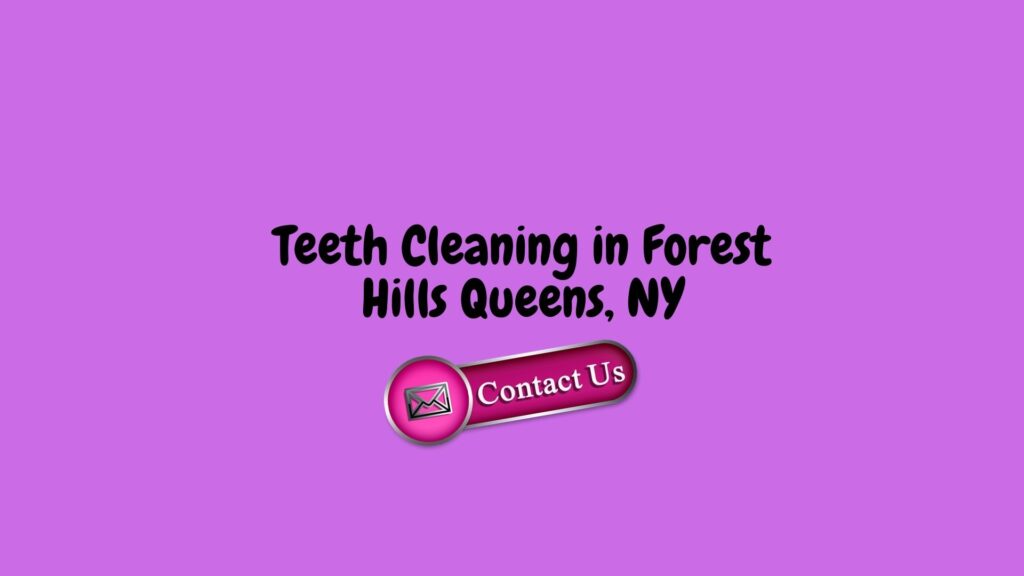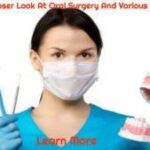Teeth Cleaning in Forest Hills Queens, NY
Cleaning your teeth is an underutilized technique that dentists use on a daily basis. According to multiple research findings, many people do not properly clean their teeth. Despite regular dental flossing and brushing, many people are uncertain of what is causing oral problems. The majority of the time, cleaning methods and routines can do more harm than good.
Dental cleaning is a procedure that removes the “buildup” on your teeth. The term “buildup” refers to more than only the food particles that humans expel on a daily basis. Tartar and plaque will continue to build upon your teeth no matter how hard you scrub them, and dentists must remove the buildup.
Regular tooth cleaning, often known as prophylaxis, is a well-known dental procedure. Special instruments are used to remove calculus plaque, stains, and calculus on the teeth’s surface above the gumline.
1. Dental Preventive Care
A proper oral hygiene practice is essential for maintaining the health of your teeth throughout your life. But there’s more to it. Dental health can have an impact on your entire health and vice versa. Dental procedures aid in the maintenance of good oral health. This is because of frequent dental exams as well as good practices like flossing and brushing. Maintaining the hygiene of your teeth should begin as soon as your infant is born and continue throughout your child’s life.
2. What Does Preventive Dentistry Entail?
If you maintain a consistent oral hygiene practice, you will be able to reduce or even eliminate the negative effects of
Periodontitis, cavities, gingivitis, enamel loss
Everyone benefits from good dental health. Children are among our society’s most vulnerable citizens. Dental sealants and fluoride treatments for children’s teeth can help prevent tooth decay.
Dental health is inextricably related to whole bodily wellness. The mouth can be an ideal environment for dangerous microorganisms to thrive. Cleaning your teeth on a regular basis might be advantageous to your general health.
Adopting proper oral hygiene practices at an early age will prevent you from dental caries, gum disease, and gingivitis later in life. Here are some of the most important factors of good oral hygiene:
Brush your teeth at least twice a day, preferably in the morning and evening. Brush your teeth with gentle bristles and fluoride toothpaste.
Floss frequently to remove food particles caught between your teeth.
After flossing, rinse your mouth with mouthwash to remove any remaining food particles.
Eat foods that include acids to avoid causing enamel damage to your teeth.
Do not smoke or use tobacco products because they can lead to oral cancer and other dental disorders.
When participating in specified activities, always sure you use a proper mouthguard.
If you often grind your teeth, talk to your dentist about getting a nightly mouthguard to keep your gums from sliding.
3. Exams by our Forest Hills dentist
Dental examinations are among the most in-depth inspections of your teeth and gums. The majority of patients, both children, and adults, should be examined at least once every six months. The main goal of these examinations is to keep your dental health in good shape. If dental health issues are not addressed promptly, the repercussions can be serious and unpleasant.
Dental examinations are often performed by both the dentist and dental hygiene professional. Although dentists can treat patients of any age, children are the primary patients who attend pediatric dentists. Dental experts who work with children have received dental training. Learn how to depth scale.
4. Treatment for Gum Disease Prevention
Gum disease, which can range from moderate bleeding gums to painful gum recession, is an issue that must be addressed as soon as possible.
Treatment for Gingivitis
Your dentist or dental hygienist will be given oral prophylaxis, often known as “prophy.” Plaque, calculus, and stains are removed supragingival (above the gum line) and subgingival (below the gum line) (below the gum line). It is also referred to as professional cleaning.
Brushing twice a day for two minutes at a time, flossing at least twice a day, and visiting your dentist on a regular basis will help you keep an attractive, healthy smile. Today, pay a visit to the best dentists in Queens.
Treatment of Periodontal Disease (Slight to Moderate)
At this point, the infection has progressed so far into the tissues that flossing, brushing, or even just brushing is insufficient to treat it. In this case, the dentist may be able to perform a noninvasive operation called scaling and root planing (SRP or short). When your dentist “scales” your teeth, they remove periodontal toxins from your pockets. The dentist smoothes the surface of your gums to aid in the reconnection of your gums. This procedure is also known as “root planing.”
An SRP, also known as a thorough cleaning, is a process that can be completed in one visit. However, depending on the level of intensity, it is usually separated into one-quarter (one-quarter of mouth) or half-hour sessions.
Treatment of Advanced Periodontal Disease
Regular SRPs, dental appointments, and a balanced eating plan are all recommended to maintain general dental hygiene. Additional treatments may be required if gum disease has advanced to stages III or IV.
The Flaps were operated on.
At this point, the supporting tissues and bones have been severely damaged. The purpose of surgical flaps is to reduce the size of periodontal pockets and regenerate PDL fibers.
After an injection of numbness with an anesthetic topical, the dentist will make an incision that looks like an opening in the flap of your gums. The flap is subsequently closed with a seal, allowing the gums to remain within the mouth. The gums are then pulled back to completely clean the inflammatory-affected tissues. The healing process will then commence.
There will be fewer pockets after the treatment, making it easier to keep your mouth healthy. Maintaining the health of your mouth with a combination of expert care and frequent home maintenance will help you avoid reoccurring infections.
Transplantation of Bone
If you lose your teeth due to gum disease, the bone that surrounds them will also go away. Because there is little support in the area, your skin’s elasticity is diminished, making you appear older.
On the plus side, bone grafting can help to repair bone loss caused by gum disease.
In this operation, the dentist inserts a prosthetic bone that works in tandem with your body’s inherent regeneration capacity. Tissue-stimulating growth factors (TSGFs) are proteins that can assist your body in the formation of bone.
If you have exposed teeth, your dentist may advise you to have an organ transplant. After a successful bone graft procedure, the healing phase varies from patient to patient. It may take 4 to 6 months to complete. The Forest Hills Dentist is available 24 hours a day, 7 days a week to help you with dental emergencies.
Pinhole Surgery
Certain experts feel that pinhole surgery can help gum tissue flourish. This is a new procedure with promising preliminary outcomes. The technology is still in its early stages and may not prove to be a viable long-term solution.
5. Dental Hygiene with our Hygienist
A dental examination begins with a physical examination performed by a dentist. The dentist will use microscopic equipment to examine your teeth. Following that, the teeth and gums are checked.
Scalers are used by dentists to remove plaque and tartar accumulation from the gums. As is usual, the removal of tartar and plaque from the gum line may be accompanied by scraping sounds. The more tartar you have to remove, the more scraping you’ll have to do to get rid of it. Dental flossing on a regular basis is an effective approach to preventing tartar buildup.
The process of Flossing The practice of flossing can be described as a technique employed by dentists to eliminate tiny particles that could be floating around in the spaces between your teeth.
Rinsing the mouth The dentist advised that you rinse the mouth using water to eliminate any buildup of pollutants.
Therapy with Fluoride The fluoride treatments will be offered in the flavors of your choice like strawberry or mint. The fluoride is then put inside the mouth.
6. The Benefits of Preventive Dentistry
Preventive dental checkups can assist your oral health in the following ways:
- Reduces the likelihood of developing gum disease or other major dental disorders.
- Encourage daily dental hygiene practices such as flossing and brushing.
- Early diagnosis of dental disorders may lower treatment costs.
- This enables your dentist to conduct comprehensive examinations of your mouth, neck, and jaw. It lowers the likelihood of acquiring dental problems as a result of several chronic medical
- diseases. Osteoporosis, diabetes, other illnesses, and food-related concerns can all have an impact on general dental health and teeth. Patients with chronic conditions require preventative
- dental care on a regular basis to protect their overall health.
7. What We Look For When Taking Routine Dental X-Rays
Dental xrays can reveal information on the state of your teeth’s enamel and the inner chambers of your mouth, among other things. While oral exams are a vital aspect of your dental exam, dental x-rays allow dentists to “fill in the gaps” and see what their eyes cannot.
The Article Teeth Cleaning in Forest Hills Queens, NY First Appeared ON
: https://snopug.org
The post Teeth Cleaning in Forest Hills Queens, NY appeared first on https://gqcentral.co.uk

